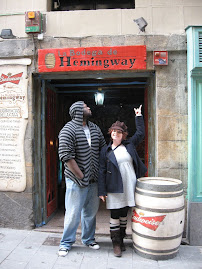..."for by reason of the 'scene-agent ratio' the individual can identify himself with the character of a surrounding situation, translating one into terms of the other; hence a shift to a grander order, the shift from thoughts of one's own individual end to thoughts of a universal end, would still contrive to portray the character of the individual, even while acquiring greater resonance and scope and enabling men to transcend too local a view of themselves" (RM 16).
"A is not identical with his colleague, B. But insofar as their interests are joined, A is identified with B. Or he may identify himself with B even when their interests are not joined, if he assumes that they are, or is persuaded to believe so" (RM 20).
"Here are the ambiguities of substance. In being identified with B, A is 'substantially one' with a person other than himself. Yet at the same time he remains unique, an individual locus of motives. Thus he is both joined and separate, at once a distinct substance and consubstantial with another" (RM 21).
"A doctrine of consubstantiality, either explicit or implicit, may be necessary to any way of life. For substance, in the old philosophies, was an act; and a way of life is an acting-together; and in acting together, men have common sensations, concepts, images, ideas, attitudes that make them consubstantial" (RM 21).
"The Rhetoric deals with the possibilities of classification in its partisan aspects; it considers the ways in which individuals are at odds with one another, or become identified with groups more or less at odds with one another" (RM 22).
"Why 'at odds,' you may ask, when the titular term is 'identification'? Because, to being with 'identification' is, by the same token, through roundabout, to confront the implications of division. And so, in the end, men are brought to that most tragically ironic of all divisions, or conflicts, wherein millions of cooperative acts go into the preparation for one single destructive act. We refer to that ultimate disease of cooperation: war" (RM 22). [Division b/t NT and ASD, Autism Speaks and Neurodiversity Movement, HFA and LFA]
"Identification is compensatory to division" (RM 22).
"insofar as the individual is involved in conflict with other individuals or groups, the study of this same individual would fall under the head of Rhetoric" (RM 23).
"Rhetoric is concerned with the state of Babel after the Fall. Its contribution to a 'sociology of knowledge' must often carry us far into the lugubrious regions of malice and the lie" (RM 23).
"In pure identification there would be no strife. Likewise, there would be no strife in absolute separateness, since opponents can join the battle only through a mediatory ground that makes their communication possible [...]. But put identification and division ambiguously together, so that you cannot know for certain just where one ends and the other kind of begins, and you have the characteristic invitation to rhetoric" (RM 26).
"we must think of rhetoric not in terms of some one particular address, but as a general body of identification that owe their convincingness much more to trivial repetition and dull daily reinforcement that to exceptional rhetorical skill" (RM 26). [Like public discourses--film, television, internet]
"The fact that an activity is capable of reduction to intrinsic, autonomous principles does not argue that it is free from identification with other orders of motivation extrinsic to it. Such other orders are extrinsic to it, as considered from the standpoint of the specialized activity alone. But they are not extrinsic to the field of moral action as such, considered from the standpoint of human activity in general. The human agent, qua human agent, is not motivated solely by the principles of a specialized activity, however strong this specialized power, in it suggestive role as imagery, may affect his character. Any specialized activity participates in a larger unit of action" (RM 27). [Like metaphor in film reflects larger cultural fear of weakness. Stigma against intellectual deficiencies. Western idolization of independence, productivity]
"But we are clearly in the region of rhetoric when considering the identification whereby a specialized activity makes one a participant in some social or economic class. 'Belonging' in this sense is rhetorical" (RM 28).
"Science, as mere instrument (agency), might be expected to take on the nature of the scenes, acts, agents, and purposes with which it is identified. And insofar as a faulty political structure perverts human relations, we might reasonably expect to find a correspondingly perverted science" (RM 29).
"The liberal is usually disinclined to consider such possibilities because applied science is for him not a mere set of instruments and methods, whatever he may assert; it is a good and absolute, and is thus circuitously endowed with the philosophic function of God as the grounding of values" (RM 30). [Back to pervasiveness of medical discourses on public view on mental/cognitive disabilities. Science connected to God. Good and absolute. Explains Autism Speaks emphasis on biomedical treatments to and research on autism.]
"Obviously, any purely secular power, such as the applications of technology, would not be simply good, bad, or indifferent, depending upon the uses to which it was put, and upon the ethical attitudes that, as part of the context surrounding it, contributed to the meaning in the realm of motives and action" (RM 30). [Justifications for DAN protocol. chelation.]
"If the technical expert, as such, is assigned the task of perfecting new powers of chemical, bacteriological, or atomic destruction, his morality as technical expert requires only that he apply himself to his task as effectively as possible. The question of what the new force might mean, as released into a social texture emotionally and intellectually unfit to control it, or as surrendered to men whose speciality is professional killing--well, that is simply 'none of his business,' as specialist, however great may be his misgivings as father of a family, or as citizen of his nation and of the world" (RM 30).
"For the history of the Nazis has clearly shown that there are are cultural situations in which scientists, whatever may be their claims to professional austerity, will contrive somehow to identify their specialty with modes of justification, or socialization, not discernible in the sheer motions of the material operation themselves. [...] The very scientific ideals of an 'impersonal' terminology can contribute ironically to such disaster: for it is but a step from treating inanimate nature as mere 'things' to treating animals, and then enemy peoples, as mere things. But they are not mere things, they are persons--and in the systematic denial of what one knows in his heart to be the truth, there is a perverse principle that can generate much anguish" (RM 32).
Friday, July 27, 2007
Subscribe to:
Post Comments (Atom)








No comments:
Post a Comment